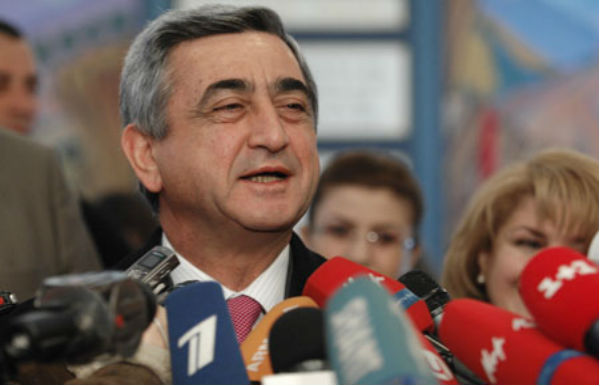
You cannot report on the president and show that only he has something to say. This is how it usually is on live television, when the camera captures the president’s remarks, but is unable to react in any way. The journalist who conveys the president’s remarks to others transmits his remarks only partially.
Recent dismissals of high-ranking officials and the the Republican Party of Armenia’s incomprehensible changes within the political leadership was expressed by all. The president never did end up commenting on the matter, though afterwards, reporters covering his visits frequently accompanied him to this or that country, recorded his words.
But here is the problem. Those reporters, arriving at, say, Brussels, with the president, present the news the same way as they would have if they hadn’t gone with him. That is, there’s no independent work.
If from Marseilles they’re conveying the current leader of the country’s optimism in future Armenia-Diaspora relations, in no way is it understandable where in that optimism is the incentive for the Diaspora’s enthusiasm and where is the incentive for Republic of Armenia citizens’ enthusiasm? The reporters accompanying Armenian President Serzh Sargsyan didn’t go into detail why, in particular, is Serzh Sargsyan optimistic and why he’s gone to Marseilles for this.
It’s a well-known fact that a journalist is not a recorder, she is a living organism, able to smile, to be concerned even in the present of the country’s president; she is able to state her concern regarding any issue — to suppose, why did the man who till the very end caused the activities of the March 1 parliamentary commission to fail become chair of the National Assembly? And after that, how is the country preparing for the most democratic and free elections in the history of the Republic of Armenia?
Generally, what is the president’s remark? In contemporary Armenian, it is characterized by one word — message. That is, the president is conveying to the reader, the radio listener, the television viewer his vision, his uneasiness. The president’s unease can reach the public through the journalist through the president’s press service; in other cases, if a journalist is present when that unease is expressed, she cannot take the Armenian president’s remarks at face value.
What’s done in Armenia’s case? The president goes to this or that province, let’s assume to be present at the opening of an infirmary or factory. Who accompanies the president? Generally, which news agencies have been accompanying the Armenian president since 2002? Exclusively the TV stations, agencies and websites under state control.
And suppose at one of those visits the Armenian president responds to, say, Heritage Party leader Raffi Hovannisian’s letter, in which the party leader urges Serzh Sargsyan to resign from the position of Yerevan State University (YSU) Board of Trustees chair. And explains by saying that you and the Board of Trustees chairs of all the other post-secondary institutions (the prime minister, ministers and so on) are “Republican-Party-of-Armenia-izing” students of YSU and other universities.
First, Raffi Hovannisian’s letter is published by news sites and newspapers, while Serzh Sargsyan’s response — by TV stations.
Serzh Sargsyan responds to Raffi Hovannisian in Gegharkunik marz (province) — the letter was not written with a heavy heart (was not considerate). Journalists from about 20 different news agencies were present and listening to this statement of the president’s. No one says anything. And his statement, in no way elaborated, is spread to Armenia, the television viewer, reader or radio listener.
Armenian Public TV’s news program “First Channel” in this sense is the litmus: at this station, there’s an understanding of “covering the president” where the role of the journalist is minimized. This is also the case at Armenia TV. This is the case with all TV companies. Journalists who cover the work of the government, for example, have some allowable margin of freedom or variation. And this is what makes the work of journalists covering the president ridiculous. Because the president’s remarks are not the efforts of any given TV company, but rather, that of the presidential staff.
The government’s press service also intervenes somewhat, but TV reporters are permitted to wrangle this or that word. It’s obvious that such manipulation in media currently doesn’t disparage the journalist and his news agency. But who said he doesn’t put the country’s president in a worse state? In Russia too, after all, weren’t TV companies throwing dust in the public’s eyes about Putin’s popularity? Again they were forced to rig the elections.
Mher Arshakyan
The views expressed in the column are those of the author's and do not necessarily reflect the views of Media.am.

Add new comment
Comments by Media.am readers become public after moderation. We urge our readers not to leave anonymous comments. It’s always nice to know with whom one is speaking.
We do not publish comments that contain profanities, non-normative lexicon, personal attacks or threats. We do not publish comments that spread hate.